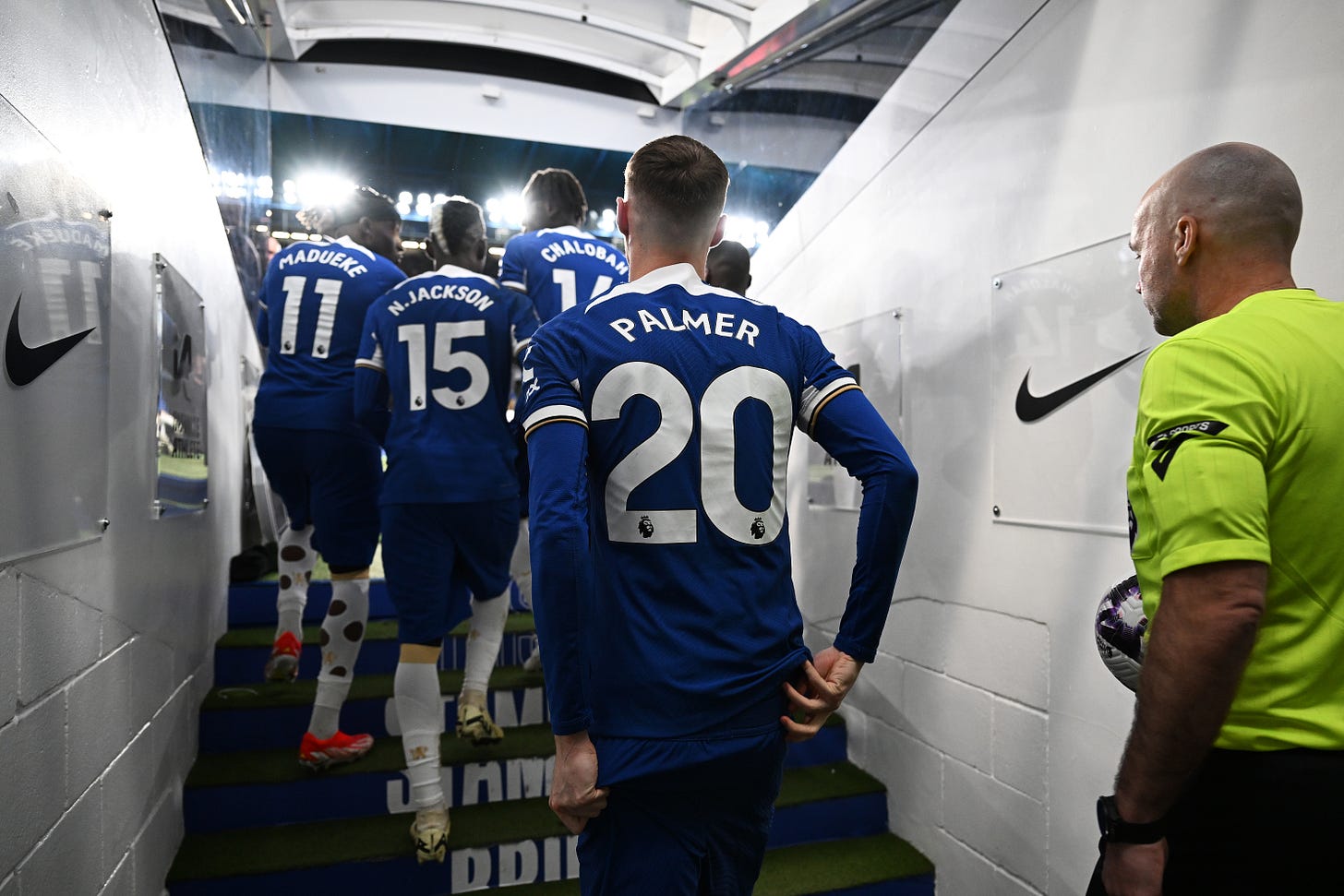COLD PALMER: CHELSEA PHENOM
The 21-year-old attacker is the West London club's only successful signing after £1 billion spent.
With Everton’s midfield all at sea, Chelsea’s 21-year-old attacking talisman drifted into the space in front of the Toffees’ backline, stopping to wait patiently for right back Malo Gusto to find him. Cole Palmer’s first touch was poor, a miscontrol, but with a flick of his right boot it was onto his left, and in a flash it was through the legs of Jarrad Branthwaite, another 21-year-old Englishman who’s firmly in Gareth Southgate’s thoughts ahead of EURO 2024 this summer.
Palmer left his compatriot for dead, then felt the pressure from Amadou Onana in behind him as Everton’s midfield just about recovered on top of him. So he back-flicked the rock to Nicolas Jackson, the Senegalese striker slipping and sliding a bit but still capable of playing his part in the wall pass as Palmer kept on running to the edge of the 18-yard box. When the ball came back to him, he met it in perfect stride and stroked it with that sweet left foot of his into the far bottom corner, dipping and swerving around Jordan Pickford’s desperate dive with just the force required—and not a mile-per-hour more—to beat the Everton keeper. It was smooth, effortless, almost detached. It was cold.
It is a terrible thing to give Chelsea credit, and yet: in amongst their billion-pound spending frenzy on various up-and-comers and never-come-ups is Cole Palmer, brought to London from Manchester City for £40 million this past summer. The born-and-raised Mancunian is an unreconstructed baller, a glider and a paceless visionary at a time when the game is getting more athletic, more physical, more high-octane each year. When he’s truly cooking, there’s a forcefield around Palmer, and when the ball enters his orbit—passes the event horizon—there’s an alteration in spacetime. The clock seems to tick at his pace. Time slows down to allow him to do his thing.
And it’s not just aesthetics. That curling wonder 13 minutes in was the first of four goals that Palmer planted in the Everton net on Monday. By the 29th minute, he had his hat trick, and a “perfect” one at that: left foot, right foot, header. He drew a penalty in the second half and—after a couple of his teammates scuffled over who would take it—stood up, seized the ball off them, and dispatched the chance with minimum fuss. He now has 20 league goals on the season, equal to mighty Erling Haaland at the top of the charts. He now has more goals than Kai Havertz had in three seasons at Chelsea. It is an astonishing start to life in posh West London for the club’s only standout success in the transfer market recently.
Of course, the penalty factor is there. Nine of Palmer’s goals have come from the spot, nearly twice as many as Bukayo Saka and Mo Salah at five. But the “penalty merchant” chirps from rival fans are falling a bit flat at this point, and that’s without getting into how taking and making penalties is a real skill. Palmer took responsibility for the task early on, took the pressure on his back, and in the process became the leader of this team in forward positions. There’s a reason he could brush the others aside to take the penalty against Everton when he was already on a hat trick and Chelsea were 4-0 up. This is serious business. He is serious business.
And frankly, his game was never limited to penalty-taking. There were just times he went missing in matches because he was asked to play (and stay) wide. He reminds me a bit of Riyad Mahrez: at Leicester City, the Algerian always had the freedom to come in from the righthand side and cause havoc with a similar combination of top-class technical ability, vision, and timing. At Manchester City, Mahrez was asked to play wider and higher and often struggled to be as influential in Pep Guardiola’s system as he was in Claudio Ranieri’s. That’s the deal you make to win trebles and cash massive paychecks, particularly when you share a team with Kevin De Bruyne. Until this season, Phil Foden had to learn the same lesson, and those two names fueled Palmer’s thirst to leave Man City shortly after he broke into the first team.




